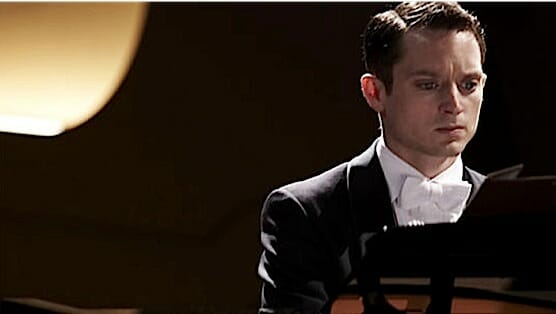Grand Piano

On paper (and at times on screen), the premise of director Eugenio Mira’s new film comes across as utterly ridiculous. Tom Selznick, a piano prodigy played nervously and wide-eyed by Elijah Wood, has not performed in five years after butchering the last four bars of an “impossible” piece written by his inimitable grandfather. He decides to get back onstage, his movie star wife Emma (Kerry Bishe) in the audience, but when he sits down to play he finds a note in his sheet music that says, “Play one wrong note and you die.” Though understandably a bit shaken, he proceeds to perform the piece with a high-powered sniper rifle’s laser point aimed at his head, his wife, and various audience members—as every review will most likely mention, Tom must literally perform under the gun. Remarkably, Mira and his cast, including John Cusack as the voice of the evil mastermind talking into Tom’s ear (he does appear near the end for a brawl in the lighting rigging), and Bill and Ted’s Alex Winter as a murderous henchman, manage to make this Roger Corman-esque plot utterly entertaining and engaging.
The trick for the viewer here, as is the case with most movies in the thriller genre, is to completely suspend your disbelief. As Tom arrives at the theater where he will make his comeback appearance, he is constantly harangued and harassed by snide comments and notes telling him not to choke. Why would the crew at the theater be so unsupportive? Who knows? How on earth could someone perform such a complicated piece in front of a huge audience while simultaneously texting and listening to death threats over an earpiece? Search me, but it doesn’t matter at all. Mira borrows the best elements of suspense masters like Hitchcock and De Palma to create a tense film with horror movie flourishes that tells its story in a compact 90 minutes.
-

-

-

-

-

-

-

-

-

-

-

-

-

-

-

-

-

-

-

-

-

-

-

-

-

-

-

-

-

-

-

-

-

-

-

-

-

-

-

-








































